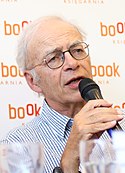Peter Singer Quote
At least ten times as many people died from preventable, poverty-related diseases on September 11, 2011, as died in the terrorist attack on the World Trade Center and the Pentagon on that black day. The terrorist attacks led to trillions of dollars being spent on the ‘war on terrorism’ and on security measures that have inconvenienced every air traveller since then. The deaths caused by poverty were ignored. So whereas very few people have died from terrorism since September 11, 2001, approximately 30,000 people died from poverty-related causes on September 12, 2001, and on every day between then and now, and will die tomorrow. Even when we consider larger events like the Asian tsunami of 2004, which killed approximately 230,000 people, or the 2010 earthquake in Haiti that killed up to 200,000, we are still talking about numbers that represent just one week’s toll for preventable, poverty-related deaths — and that happens fifty-two weeks in every year.
At least ten times as many people died from preventable, poverty-related diseases on September 11, 2011, as died in the terrorist attack on the World Trade Center and the Pentagon on that black day. The terrorist attacks led to trillions of dollars being spent on the ‘war on terrorism’ and on security measures that have inconvenienced every air traveller since then. The deaths caused by poverty were ignored. So whereas very few people have died from terrorism since September 11, 2001, approximately 30,000 people died from poverty-related causes on September 12, 2001, and on every day between then and now, and will die tomorrow. Even when we consider larger events like the Asian tsunami of 2004, which killed approximately 230,000 people, or the 2010 earthquake in Haiti that killed up to 200,000, we are still talking about numbers that represent just one week’s toll for preventable, poverty-related deaths — and that happens fifty-two weeks in every year.
Related Quotes
About Peter Singer
On two occasions, Singer served as chair of the philosophy department at Monash University, where he founded its Centre for Human Bioethics. In 1996 he stood unsuccessfully as a Greens candidate for the Australian Senate. In 2004 Singer was recognised as the Australian Humanist of the Year by the Council of Australian Humanist Societies. In 2005, The Sydney Morning Herald placed him among Australia's ten most influential public intellectuals. Singer is a cofounder of Animals Australia and the founder of the non-profit organization The Life You Can Save.
